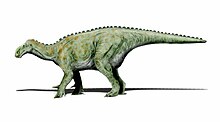Wikijunior:Dinosaurs/Iguanodon

Iguanodon was once the one of the common dinosaurs. It was also one of the earliest dinosaurs to be discovered and named. Its name means Iguana Tooth in Greek.
What did it look like?
edit| Dinosaurs |
|
Tyrannosaurus Rex |
Iguanodon was a big dinosaur. It grew to be thirty feet long, 9,000 pounds (3-4 tons), and had a bulky body. Its neck was long and it had a long tail and a beak. The mouth had teeth in the cheeks toward the back and a sharp beak at the front. Iguanodon usually walked on four legs, but could stand on two if it wanted to reach high. It had four fingers and a bony cone-shaped spike/thumb, which was used for stabbing things trying to harm the Iguanodon.
What did it eat?
editIguanodon was a plant eater. It ate cyads and conifers as well as early flowering plants. It used its teeth to chew its food.
When did it live?
editIguanodon lived between 130 and 65 million years ago.
Where did it live?
editEverywhere! Its habitats were: beaches, plains, forests, mountains, deserts and swamps. It lived in North and South America, Asia, Europe, Australia, Belgium, Spain and England.
How was it discovered?
editA single Iguanodon tooth was discovered in 1822, one of the earliest dinosaur discoveries. The dinosaur was named Iguanodon in 1825 by Dr. Gideon Mantell, because its teeth were similar to the modern day iguana.
Why does it have a spike on its hand?
editIguanodon had a large spike on both of their hands, where our thumb would be. Originally, it was thought to go on the Iguanodon's nose, like a rhino horn. Later it was discovered that the spike actually goes on the hand. But what was it used for? Some say it could have been used to defend against attacking predators. Others say that the spike was used in fights when two rival Iguanodon met.
What do we need to learn?
edit- What the spike was used for
- The colour of skin
- How it was so common and adaptable.